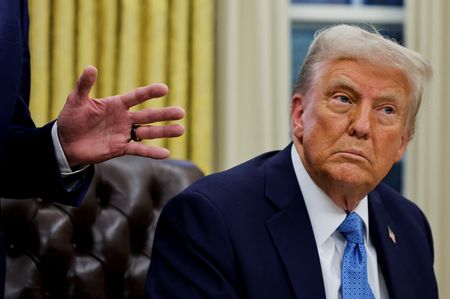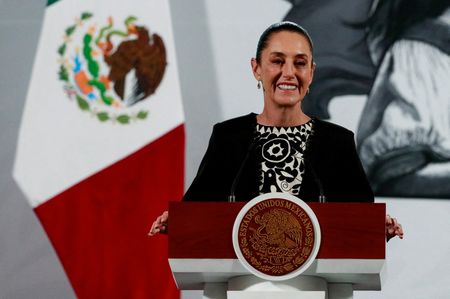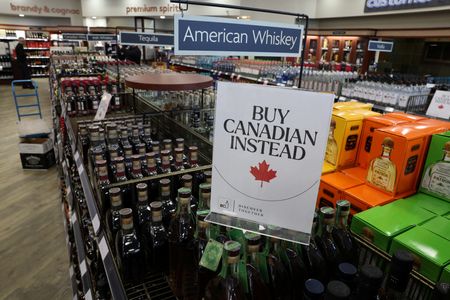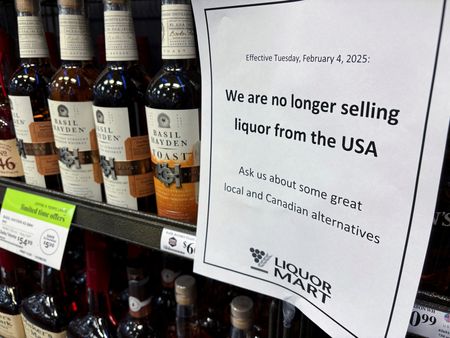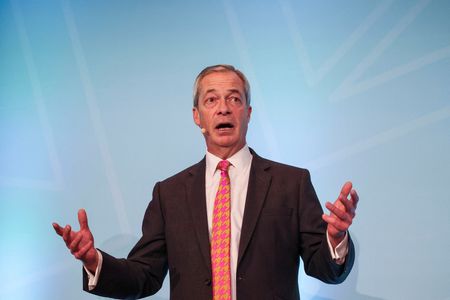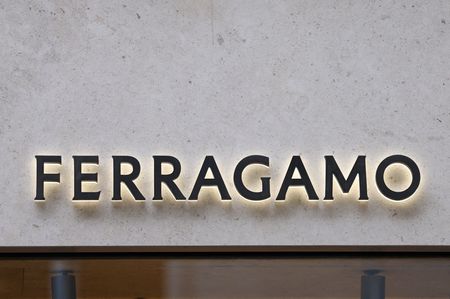By David Alire Garcia, David Lawder and Bart H. Meijer
MEXICO CITY/WASHINGTON/BRUSSELS (Reuters) -U.S. President Donald Trump paused new tariffs on Mexico for one month after Mexico agreed on Monday to reinforce its northern border with 10,000 National Guard members to stem the flow of illegal drugs.
The agreement also includes a U.S. commitment to prevent trafficking of high-powered weapons to Mexico, Mexican President Claudia Sheinbaum said on X. The two leaders spoke by phone on Monday, just hours before U.S. tariffs on Mexico, China and Canada were set to take effect – steep levies that economists say would cause widespread economic harm, including raising prices for U.S. businesses and consumers.
The U.S. and Mexico will use the month-long suspension to engage in further negotiations, Trump said on social media.
“I look forward to participating in those negotiations, with President Sheinbaum, as we attempt to achieve a ‘deal’ between our two Countries,” he wrote on Truth Social.
“We have this month to work and convince each other that this is the best way forward,” Sheinbaum said at a press conference.
The agreement comes less than 48 hours after Trump announced sweeping tariffs on goods from the top three U.S. trading partners – accounting for $2.1 trillion of annual commerce – was emblematic of the often chaotic nature of the early days of his second presidency. While the deal eases the pressure for now on Mexico, prospects for a comparable reprieve imminently for Canada and China appeared dim, as Trump and his team kept up their criticism of the U.S. northern neighbor in particular.
“We’re not treated well by Canada and we have to be treated well,” Trump said during an executive order signing at the White House.
Trump said on Monday he had spoken with Canadian Prime Minister Justin Trudeau and would do so again at 3 p.m. ET (2000 GMT). The tariffs on Canada and China remain poised to begin at 12:01 a.m. on Tuesday (0501 GMT Wednesday), and Canada has announced retaliatory tariffs.
A senior Canadian official told a New York Times reporter that Ottawa is not optimistic a similar reprieve is in the offing, the reporter said on X.
Fears of a deepening trade war and the economic damage it could cause sent U.S. and global stocks lower, although the announcement of the one-month waiver for Mexico helped reverse some of the decline.The benchmark S&P 500 was down 0.6% around mid-afternoon, cutting its losses on the day by more than half. The surprise turn of events also relieved some of the pressure on Mexico’s peso.
Speaking in Washington on Sunday, Trump suggested the 27-nation European Union would be his next target, but did not say when.
“They don’t take our cars, they don’t take our farm products. They take almost nothing and we take everything from them,” he told reporters.
EU leaders at an informal summit in Brussels on Monday said Europe would be prepared to fight back if the U.S. imposes tariffs, but also called for reason and negotiation.
Chancellor Olaf Scholz of Germany said the bloc could respond if necessary with its own tariffs, but stressed it was better for the two to find agreement on trade.
Trump hinted that Britain, which left the EU in 2020, might be spared tariffs, saying: “I think that one can be worked out”.
The U.S. is the EU’s largest trade and investment partner. According to the Eurostat data from 2023, the United States had a deficit of 155.8 billion euros ($161.6 billion) with the EU in the trade of goods, offset by a surplus of 104 billion euros in services.
EU foreign policy chief Kaja Kallas said there were no winners in a trade war, and if one broke out between Europe and the United States, “then the one laughing on the side is China”.
MARKETS SWOON
Economists say the Republican president’s plan to impose 25% tariffs on Canada and Mexico and 10% tariffs on China would slow global growth and drive prices higher for Americans.
The International Chamber of Commerce estimates that the tariffs would lead to a 10% drop in exports from Mexico, slicing 4% from the country’s GDP over a year, global policy director Andrew Wilson told Reuters.
Proposed duties on Canada will lead to a 2.6% drop in the country’s GDP, he said.
Trump, who acknowledged over the weekend that the tariffs could cause some short-term pain for U.S. consumers, nevertheless has argued the tariffs are needed to curb immigration and narcotics trafficking and spur domestic industries.
Financial market reaction on Monday reflected concerns about the fallout from a trade war, with stocks lower around the world, and the Chinese yuan, Canadian dollar and Mexican peso all slumping against a soaring dollar. With Canada and Mexico the top sources of U.S. crude oil imports, U.S. oil prices climbed 0.5%, while gasoline futures rose more than 2%.
Trump’s tariffs would cover almost half of all U.S. imports and would require the United States to more than double its own manufacturing output to cover the gap – an unfeasible task in the near term, ING analysts wrote.
Other analysts said the tariffs could throw Canada and Mexico into recession and trigger “stagflation” – high inflation, stagnant growth and elevated unemployment – at home.
In Europe, economists at Deutsche Bank said they were currently factoring in a 0.5% hit to gross domestic product should Trump impose 10% tariffs on the bloc.
NATIONAL EMERGENCY
The White House has not detailed what specific steps Canada or China would need to take to avoid the tariffs.
Trump vowed to keep the sanctions in place until the end of what he described as a national emergency over fentanyl, a deadly opioid, and illegal immigration to the U.S.
China called fentanyl America’s problem and said it would challenge the tariffs at the World Trade Organization and take other countermeasures, but also left the door open for talks.
Canada said it would take legal action under the relevant international bodies to challenge the tariffs.
(Reporting by David Alire Garcia, Stefanie Eschenbacher and Brendan O’Boyle in Mexico City; Andrea Shalal, David Lawder, Daphne Psaledakis, Douglas Gillison, Doina Chiacu and Susan Heavey in Washington; Jarrett Renshaw in West Palm Beach, Florida; Promit Mukherjee in Ottawa; Kevin Krolicki and Qiaoyi Li in Beijing; Josephine Mason in London; Bart H. Meijer, Alessandro Parodi, Charlotte Van Campenhout, Andrew Gray, Sudip Kar-Gupta and Geert De Clerq in Europe; Writing by Andy Sullivan, Doina Chiacu, Sharon Singleton and Joseph Ax; Editing by Gareth Jones, Alistair Bell and Lisa Shumaker)

